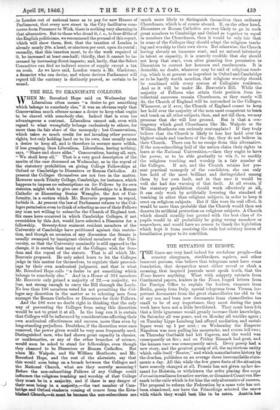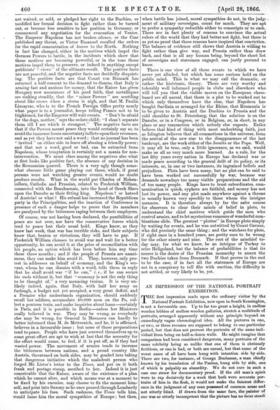THE SITUATION IN EUROPE.
THE times are very hard indeed for credulous people—the country clergymen, stockbrokers, squires, and other innocent persons, who believe that telegrams must have some foundation, that despatches must either reveal or cloak a meaning, that inspired journals must speak truth, that the Times knows anything. What with snippety extracts from Continental papers, leaders in the Times,, forged letters from. the Foreign Office to explain the leaders, rumours from Berlin, gossip from Italy; special telegrams from Vienna, ha- portant documents from the great chancelleries too old to be of any use, and bran new documents from chancelleries: too small to be of any importance, they must during- the past week have been not a little bewildered. They must have felt that a little ignorance would greatly increase their knowledge. On Saturday all was peace, and on Monday all warlike again ; on Tuesday Lippe Lemberg had offered mediation, and metal- liques went up 1 per cent. ; on Wednesday, the Emperor Napoleon was seen pulling his moustache, and rentes fell two ; on Thursday Garibaldi had left Caprera, and the world WA consequently on fire ; and on Friday Bismark had goat, and, the lkuman race- was consequently saved. Ewery gossip had a new story, and the greatest gossip of all, the mysterious entity, which calls itself "Reuter: and which manufactures history by the drachm, publishes on an average three irreconcilable state. meats a day. All this while- the few grave facts of the situation have scarcely changed at all. Prussia has not given up-her de- mand for Holstein, or withdrawn the order placing five corps darine'ein.readisess for active service, or dismissed. Count von Bia. mark to the exile which is for him the only alternative of success. The proposal to reform the Federation by a mass vote has not been abandoned, nor have the Princelings selected the sauce with which they would best like to be, eaten. Austria. WA
mot waived, or sold, or pledged her right to the Duchies, or modified her formal decision to fight rather than be turned out, or become less sensitive to her position in Germany, or commenced any negotiation for the evacuation of Venice. The Emperor Napoleon has not broken silence, or the Czar published any threat, or Victor Emanuel recalled the orders for the rapid concentration of forces to the North. Nothing in fact has changed, either in the motives which impel the German Powers to battle, in the incidents which show that those motives are becoming powerful, or in the tone those motives impel them to preserve, or indeed in anything except publicists' " views " of the ultimate result. The positive facts are not peaceful, and the negative facts are decidedly disquiet- ing. The positive facts are that Count von Bismark has returned a half consent to the demand to disarm, that Italy is arming fast and anxious for money, that the Kaiser has given Hungary new -assurances of his good faith, that metalliques are sinking steadily, that the "minor Powers " are scuttling about like crows when a storm is nigh, and that M. Paulin Limayrac, who is to the French Foreign Office pretty nearly what paper is to a journalist, keeps telling France not to be frightened, for the Emperor will wait events. " Don't be afraid for the dogs, mother," says the sedate child; "I shan't separate them till I see which is strongest." The negative facts are that if the Powers meant peace they would certainly say so, to avoidthe immense losses uncertaintyinflicts upon their revenues, and as yet they have not said a word ; that no journal has been " invited " on either side to leave off abusing a friendly power; and that not a word, good or bad, can be extracted from Napoleon, whose temptation is certainly not a mania for non- intervention. We must class among the negatives also what at first looks like positive fact, the absence of any decision in the Roumanian quarrel. There is a very ugly though some- what obscure little game playing out there, which, if great persons were not watching greater events, would no doubt produce results. What in the world put Charles of Hohen- zollern, Catholic and Prussian, related to Frederick William, connected with the Beauharnais, into the head of Greek Slays upon the Danube as their fitting king. Napoleon ? or hatred of Austria? or what ? His refusal has increased the Republican party in the Principalities, and the inaction of Conference in presence of such a danger helps to prove that its members are paralyzed by the bitterness raging between their employers.
Of course, war not having been declared, the possibilities of peace are not over, nor have the conservative forces which tend to peace lost their usual hold. Kings know, as they knew last week, that war has terrible risks, and their subjects know that, beaten or victorious, they will have to pay. If Frederick William chooses to avoid war and wait for a better opportunity, he can avoid it at the price of reconciliation with his people, an option which has been before him any time these three months ; and if the people of Prussia are unani- mous, they can make him avoid it. They, however, only pro- test in addresses on behalf of economy, and the King's ser- vant, whom he can dismiss with a word, tells them in reply that he shall avoid war " if he can," i. e., if he can secure his ends without it, but that "economy is not the only thing to be thought of," a very menacing truism. It is very un- likely indeed, again, that Italy, with half her army on furlough, a budget not yet accepted, a very great deficit, and a Premier who understands organization, should suddenly recall her soldiers, accumulate 40,000 men on the Po, col- lect a pontoon train, and make inquiries about loans—certainly in Paris, and it is possible in Berlin—unless her Ministers really believed in war. They may be wrong, as everybody else may be wrong, for General la Marmora can hardly be better informed than M. de Metternich, and he, it is affirmed, believes in a favourable issue ; but none of those preparations tend to peace. People who have just screwed themselves up to some great effort are apt to wish at last that the necessity for the effort would come, to feel, if it is put off, as if they had wasted power. The movement of armies tends to increase the bitterness between nations, and a proud country like Austria, threatened on both sides, may be goaded into taking that dangerous initiative which the maladroit person who forged Mr. Lister's letter to the Times, and put on it both frank and postage stamp, ascribed to her. Indeed it is just conceivable that the Kaiser, aware of the existence of a plan which he cannot alter, and which means war at a moment to be fixed by his enemies, may choose to fix the moment him- self, and pour into Saxony as he once poured through Lombardy to anticipate his foes. Such rashness, the Times tells him, would loose him the moral sympathies of Europe ; but then,
when battle has joined, moral sympathies do not, in the judg- . ment of military sovereigns, count for much. They are apt to prefer a sympathy reducible either to conscripts or to cash. There are in fact plenty of reasons to convince the actual rulers of the world that they had better not fight, but there is as yet no proof that those reasons have inspired that conviction. The balance of evidence still shows that Austria is willing to fight rather than give way, and Prussia rather than draw back, and that is all any human being, beyond the short list of sovereigns and statesmen engaged, can justly pretend to know.
There is one view of all these events to which we have never yet alluded, but which has some curious hold on the public mind. This is what we may call the dramatic, or rather the histrionic, theory. There are very worthy and tolerably well informed people in clubs and elsewhere who will tell you that the visible moves on the European chess- board are all unreal, that there is a plot to be worked out to which only themselves have the clue, that Napoleon has bought Sardinia or arranged for the Rhine, that Roumania is- to be given to Austria and the Duchies to Prussia and the cold shoulder to St. Petersburg, that the solution is on the Danube, or in a Congress, or in Belgium, or, in short, in any place or any transaction which nobody else expects. Exiles believe that kind of thing with most undoubting faith, just as Islington believes that all commotions in the universe, from the arrival of the new star to the disappearance of the last bankrupt, are the work either of the Jesuits or the Pope. Well, it may all be true, only a little ignorance, as we said, would make us all so very much more learned. As a rule, for the last fifty years every nation in Europe has declared war or made peace according to the general drift of its policy, or its interests, or, in one or two instances, its ingrained beliefs and prejudices. Plots have been many, but no plot can be said to have been worked out successfully by war, because war demands nowadays too many visible preparations- and the aid of too many people. • Kings have to trust subordinates, com- munication is quick, cyphers are faithful, and money has not lost its power, and any plot made anywhere against a throne is usually known very speedily to those whom the intrigue menaces. It is therefore always by far the safer course for observers to clear their minds of belief in plots, to understand the chief motives which guide the men who control armies, and to let mysterious rnmoursof wonderful com- binations slide. The greatest " plotter" in Europe plots simply by waiting for events, and he was outwitted by Count Cavour, who did precisely the same thing ; and the watchers for plots, if right once in a hundred years, are pretty sure to be wrong for the other ninety and nine. The root of the mischief to- day may, for what we know, be an intrigue of Turkey to seize Heligoland, but the balance of probabilities is that its source is the desire of the Prussian monarchy to annex the two Duchies taken from Denmark. If that proves in the end to be the case, if in fact all the statesmen of Europe are not in a conspiracy to tell fibs with unction, the difficulty is not settled, or very likely to be, yet.































 Previous page
Previous page